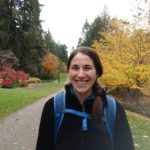 Dr Anne Otwell receives a prestigious Science and Technology Policy Fellowship through the American Association for the Advancement of Science. Congratulations Annie! Currently in David Stahl’s lab, working on understanding the biotic and abiotic factors controlling denitrification activity, including the production and consumption of the greenhouse gas nitrous oxide. We had a chance to catch up with her before she heads out to Washington DC.
Dr Anne Otwell receives a prestigious Science and Technology Policy Fellowship through the American Association for the Advancement of Science. Congratulations Annie! Currently in David Stahl’s lab, working on understanding the biotic and abiotic factors controlling denitrification activity, including the production and consumption of the greenhouse gas nitrous oxide. We had a chance to catch up with her before she heads out to Washington DC.
Can you tell us the details of your fellowship?
I will be doing a Science and Technology Policy Fellowship through the American Association for the Advancement of Science (called the AAAS STPF). My fellowship is in the executive branch, and my position is for the Department of Energy. I will be working for the Advanced Algal Systems team, which is located within the Bioenergy Technologies Office (BETO) within the Office of Energy Efficiency and Renewable Energy (EERE). The fellowship is one year, but often fellows renew for a second year.
Here are websites with more description:
https://www.aaas.org/programs/science-technology-policy-fellowships/become-st-policy-fellow
“ AAAS Science & Technology Policy Fellowships (STPF) provide opportunities to outstanding scientists and engineers to learn first-hand about policymaking while contributing their knowledge and analytical skills to the federal policymaking process. Fellows serve yearlong assignments in the executive, legislative and judicial branches of the federal government in Washington.”
How did you hear about the opportunity?
I heard about the fellowship back in graduate school and I was interested at the time, so the idea of this opportunity has been in my mind for a while now. A close friend from the graduate school received the fellowship last year and talking with her about it is what reminded me of this opportunity and motivated me to apply.
What inspired you to submit an application?
When I reviewed the information about the application, I realized it was exactly the type of opportunity that I was looking for at this point in my career. While I have enjoyed my scientific path so far, I have been searching for a way to transition to a field where I feel that I am working more directly on issues I care most about, in particular sustainability. This fellowship teaches scientists about policymaking, and it trains us on how to apply our scientific skills to contribute to solving societal-level issues. Therefore, it is the type of opportunity I have been looking for where I can build upon my scientific background and transition to a new and hopefully fulfilling field.
What did the process entail?
The application process was pretty long with several steps, but it was a very valuable learning experience. Applications open on June 1st and are due on November 1st. The initial application package includes a personal statement (describing your motivations for applying to the fellowship and what you feel you would bring as a fellow), two other shorter statements (describing your professional biography along with extracurricular involvement), a CV, and reference letters. I found out in February that I was selected as a semi-finalist, and I was asked to write a policy memo on a particular topic. The semi-finalist interview was with a panel of experts involved in science and policy. I was asked to present the policy memo and then I was asked a range of typical interview questions. I found out in March that I was selected as a finalist for the fellowship, and then I took part in a week-long interview process with multiple offices within the executive branch of the government. I ended up interviewing with 10 different offices.
What did you get out of the interview experience?
The interview process helped me to think deeply about my professional goals moving forward and to express those goals. Writing a policy memo was a new experience for me, and I really enjoyed it. For me, the semi-finalist interview was the most intense of the interviews, as we were interviewed by a panel of 8-9 people, and it was pretty fast-paced. The finalist interviews were overall more conversational. It was interesting to meet with many different people from different agencies in the government and to learn about the work they are doing.
What do you hope to get out of the fellowship?
I feel that effective policies have great potential to make positive changes, and I am excited to learn as much as I can about the intersection of science and policy. I am hoping that this fellowship will serve as a professional transition for me and will help me decide what career opportunities I want to pursue in the future.
I would be happy to discuss the fellowship and share my experience with anyone interested in applying!
